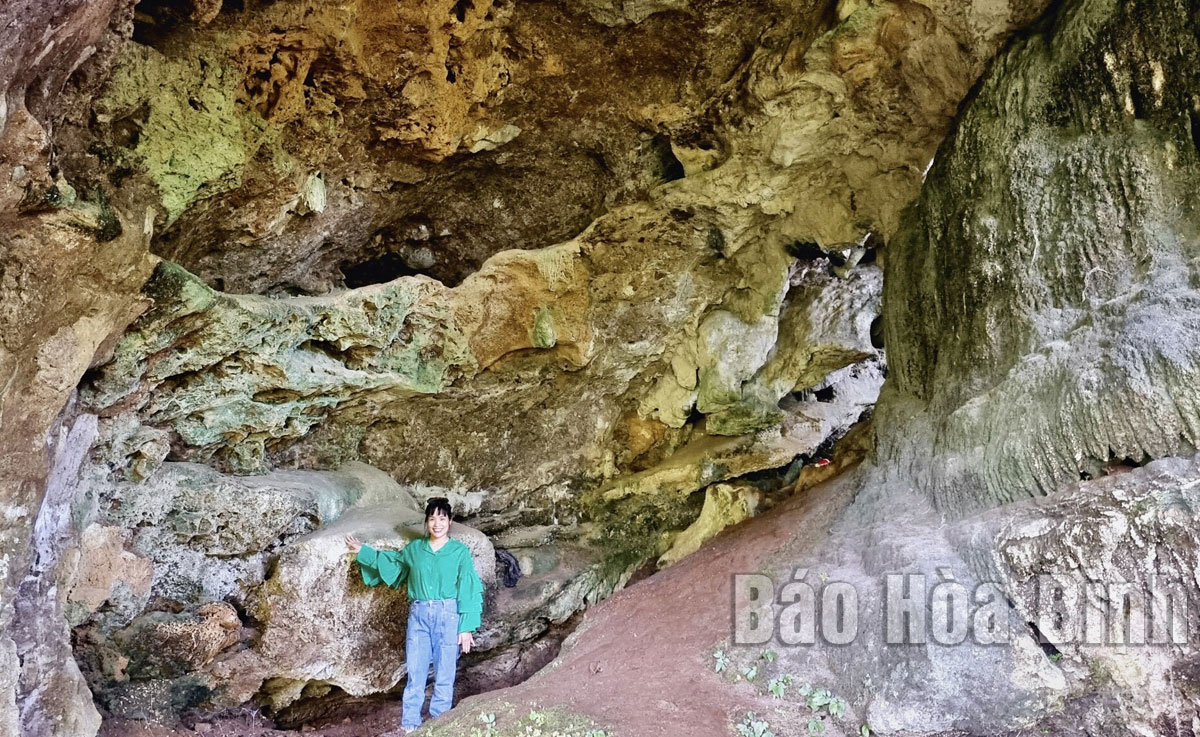
(HBO) - Invested in restoration and completed its Phase I in late 2022, the historical site of President Ho Chi Minh's visit at Chi Hoa production group in Doc Phan hamlet, Lam Son commune, has so far attracted many visitors, including Party and State leaders, representatives from provinces and cities, and local residents.

Tourists explore Cho
Cave - a nationally-ranked archaeological site located in the Sang mountain
range, Cao Son commune, Luong Son district.
Bui Quoc Hoan, Deputy Chairman of Luong Son district
People's Committee, stated that the historical site of President Ho Chi Minh's
visit at Chi Hoa production group is one of the prominent restoration projects
of the locality in recent years to preserve and promote cultural heritage
value.
According to statistics, the entire district has 45
historical sites, including nine scenic spots, two revolutionary historical
sites, 30 cultural historical sites, and five archaeological sites. Currently,
there are 16 ranked historical sites, consisting of eight at the national level
and eight at the provincial level. Between 2018 and now, with various sources
of funding, some historical sites have been renovated and restored.
Since 2020, the district has organised two training courses
on Muong gong playing skills; one training course on popularising and
instructing Muong ethnic folk songs and dances. It has also built plans for
conserving and promoting the value of intangible cultural heritage of Mo Muong
– a job and also a performance practiced at funerals, religious festivals, and
life cycle rituals by the Muong ethnic group – as well as the group’s ethnic
costumes, language, and script. The district has also submitted a proposal for
Nguyen Thi Hinh from Lam Son commune to be awarded the title of excellent
artisan in the field of Muong gong playing and Mo Muong.
The local community-based cultural and artistic movement has
developed strongly in terms of both quantity and quality, maintaining 146
cultural and artistic teams with over 2,100 members.
To enhance the conservation and promotion of intangible
cultural heritage, Luong Son is actively implementing solutions to mobilise the
strength of the entire society, including heritage conservation in the task of
economic and cultural development. The authorities are also intensifying the
dissemination and education of related laws, promoting the outstanding values
of intangible cultural heritage, and raising the awareness of residents and
tourists, with an emphasis on the responsibility of protecting and sustainably
exploiting the heritage value.
With an increasingly vibrant and widespread emulation movement aimed at building cultured residential areas and cultured families, Yen Thuy District has been making steady progress toward improving both the material and spiritual well-being of its people, while fostering a civilized, prosperous, beautiful, and progressive community.
Once lacking recreational spaces and community facilities, Residential Group 2 in Quynh Lam Ward (Hoa Binh City) has recently received attention for the construction of a new, spacious, and fully equipped cultural house. The project followed the model of state support combined with public contributions in both labor and funding.
The "All people unite to build cultural life" movement, which has been effectively integrated with Kim Boi district’s socio-economic development goals, is fostering a lively spirit of emulation across local residential areas, hamlets, villages, public agencies, and enterprises. In addition, through the initiative, traditional cultural values are being preserved and promoted, while community solidarity and mutual support in poverty reduction and economic development are being strengthened.
A working delegation of the Hoa Binh provincial People’s Committee led by its Permanent Vice Chairman Nguyen Van Toan on June 11 inspected the progress of a project to build the Mo Muong Cultural Heritage Conservation Space linked to tourism services in Hop Phong commune, Cao Phong district.
Born and growing in the heroic land of Muong Dong, Dinh Thi Kieu Dung, a resident in Bo town of Kim Boi district, in her childhood was nurtured by the sweet lullabies of her grandmother and mother. These melodies deeply imprinted on her soul, becoming an inseparable part of her love for her ethnic group's culture. For over 20 years, this love for her hometown has driven Dung to research, collect, and pass down the cultural values of the Muong people to future generations.
In the final days of May, the Ethnic Art Troupe of Hoa Binh Province organized performances to serve the people in remote, mountainous, and particularly disadvantaged areas within the province. These were not just ordinary artistic shows, but they were the meaningful journeys aimed at spreading cultural values, enhancing the spiritual life of the people and contributing to the preservation of ethnic minority cultural identities.



